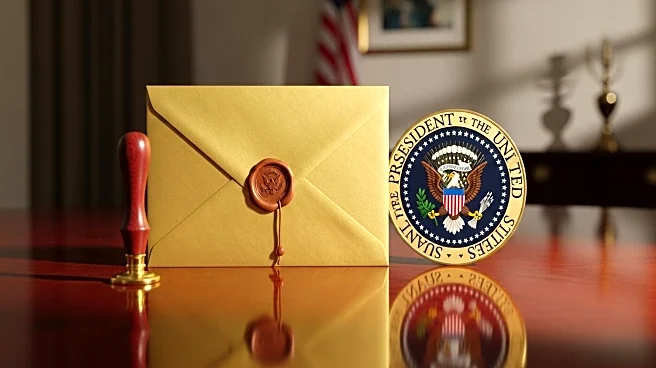What's Happening?
During critical Gaza ceasefire negotiations, Qatar's Prime Minister secretly communicated with U.S. President Trump's envoys, Jared Kushner and Steve Witkoff, urging them to pressure Israel into a compromise. The talks, held in Sharm el-Sheikh, aimed
to end the ongoing conflict between Israel and Hamas. Despite initial demands from Hamas for a full Israeli withdrawal from Gaza, a compromise was reached where Israel retained control over certain areas while withdrawing from others. This agreement was facilitated by intense pressure from the U.S., including direct involvement from President Trump, who assured Israeli Prime Minister Benjamin Netanyahu that the deal would not compromise Israel's security. The negotiations focused on specific goals like hostage exchanges and pauses in fighting, rather than a complete withdrawal or disarmament, which had previously led to breakdowns in talks.
Why It's Important?
The ceasefire agreement marks a significant step towards stabilizing the region, potentially reducing violence and fostering a more peaceful environment. The involvement of President Trump and the U.S. highlights the international dimension of the conflict and the influence of global powers in Middle Eastern affairs. The compromise reached could pave the way for future negotiations, setting a precedent for resolving territorial disputes through diplomatic channels. The agreement also reflects the shifting dynamics in the region, with countries like Qatar playing a crucial role in mediating peace efforts. The resolution of hostages and territorial control could lead to improved relations between Israel and its neighbors, impacting regional security and economic conditions.
What's Next?
Following the agreement, stakeholders will likely focus on implementing the terms of the ceasefire, including the exchange of hostages and the release of Palestinian prisoners. Monitoring the adherence to territorial concessions will be crucial to maintaining peace. Future negotiations may address unresolved issues, such as the identities of prisoners to be released. The international community, including the U.S., Qatar, and Egypt, may continue to play a role in ensuring compliance and facilitating further dialogue. The agreement could also influence broader geopolitical strategies in the Middle East, with potential shifts in alliances and diplomatic relations.
Beyond the Headlines
The ceasefire agreement may have deeper implications for the political landscape in the Middle East. It could affect the internal dynamics within Israel and Hamas, influencing leadership decisions and public opinion. The role of Qatar and other Arab states in mediating the agreement highlights the growing influence of regional powers in international diplomacy. The compromise reached may also impact future peace processes, encouraging a more pragmatic approach to conflict resolution. Additionally, the involvement of President Trump underscores the importance of U.S. foreign policy in shaping outcomes in the region, potentially affecting future administrations' strategies.
















